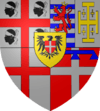Charles Felix of Sardinia
| Charles Felix | |||||
|---|---|---|---|---|---|
 | |||||
| King of Sardinia and Duke of Savoy | |||||
| Reign | 12 March 1821 – 27 April 1831 | ||||
| Coronation | 25 April 1821 | ||||
| Predecessor | Victor Emmanuel I | ||||
| Successor | Charles Albert | ||||
| Born |
6 April 1765 Royal Palace, Turin, Kingdom of Sardinia | ||||
| Died |
27 April 1831 (aged 66) Palazzo Chablais Palazzo Chablais, Turin, Kingdom of Sardinia | ||||
| Burial |
28 April 1831 Hautecombe Abbey, Saint-Pierre-de-Curtille | ||||
| Spouse | Maria Cristina of Naples and Sicily (m. 1807–31); his death | ||||
| |||||
| House | House of Savoy | ||||
| Father | Victor Amadeus III of Sardinia | ||||
| Mother | Maria Ferdinanda Antonia of Spain | ||||
| Religion | Roman Catholicism | ||||
| Signature |
| ||||
Charles Felix (Italian: Carlo Felice Giuseppe Maria; 6 April 1765 – 27 April 1831) was the Duke of Savoy, Piedmont, Aosta and King of Sardinia from 1821 to 1831.
Biography
Early life
Carlo Felice di Savoia was born in Turin as the eleventh child and fifth son born to Victor Amadeus III of Savoy and Maria Antonia Ferdinanda of Spain. His paternal grandparents were Charles Emmanuel III of Savoy and his German wife Polyxena of Hesse-Rotenburg. His maternal grandparents were French born King Philip V of Spain and his Italian wife, Elisabeth Farnese.
He was a younger brother of two other rulers of Savoy Charles Emmanuel IV and Victor Emmanuel I. He spent his childhood with his sister Maria Carolina and Count of Moriana where they lived at the Castle of Moncalieri. Carlo Felice was reported as having a closed character, prone to loneliness, with an almost ascetic (which for some time, had flashed the ecclesiastical career) and a sacral conception of the monarchy and the right to reign. With the Napoleonic occupation of Piedmont in 1796, he lost the crown of Savoy, the Duchy of Savoy and area of Genevois. Carlo Felice, who was titled Duke of Genoa, obtained the title of Marquis of Susa in compensation for his nominal loss.
Succession
He was a younger brother of Charles Emmanuel IV and Victor Emmanuel I. He was not expected to ever succeed to the throne. However Charles Emmanuel never had any children and abdicated the throne on 4 June 1802. Victor Emmanuel had four living daughters when he abdicated the throne in 1821. As the succession was regulated by the Salic Law, Charles Felix succeeded his brother on the throne.
Since Charles was in Modena at the time of his succession, he appointed as Regent his cousin, and heir, Charles Albert (of the Carignano branch of the Savoy family). Charles Albert was in touch with the liberal revolutionaries at that time, and immediately granted their request for a constitution. All this occurred between the 6 and 14 March 1821.
Even before he reached Turin, Charles Felix repudiated the Regent's promise and, to help restore order, called in the Austrians, who stayed in Piedmont till 1823. In that same year Charles Albert went to Spain to extinguish by force of arms the last sparks of revolt, making himself an object of hatred as the betrayer of Italian liberalism, but regaining the confidence of the King, who might have chosen another successor.
Charles Felix was a true reactionary, convinced that the world would soon be swept clean of all those - in his view - wicked and sacrilegious innovations introduced by the French Revolution and diffused throughout Europe by Napoleon Bonaparte "the rascal" as he called him.
Marriage
He was married by proxy to Princess Maria Cristina of Naples and Sicily (17 January 1779 – 11 March 1849) on 7 March 1807. She was a daughter of Ferdinand I of the Two Sicilies and Maria Carolina of Austria, (1752-1814), sister of the famous Marie Antoinette (1755-1793), later Queen of France .
Death and Succession
Charles Felix died without issue, in Turin at the Palazzo Chablais which had been given to him by his sister Princess Maria Anna, Duchess of Chablais, after a reign of ten years. He was succeeded by the senior male member of his dynastic house, the regent Charles Albert (1798-1849). He was the last surviving grandchild of Philip V of Spain.
Legacy
The Teatro Carlo Felice in Genoa is named for him.
The principal road of the island of Sardinia, the Strada statale 131 Charles Felix, which connects the towns of Cagliari and Sassari-Porto Torres, constructed in the 19th century, is named for him.
Ancestry
Titles, styles, honours and arms
Titles and styles

- 6 April 1765 – 12 March 1821 His Royal Highness the Duke of Genevois
- 12 March 1821 – 27 April 1831 His Majesty the King of Sardinia
Arms
- écartelé, en 1 d'argent, à la croix de gueules, cantonnée de quatre têtes de maures de sable, tortillées d'argent, en 2 grand quartier parti en 1 burelé d'azur et d'argent de dix pièces au lion de gueules armé lampassé et couronné d'or brochant sur le tout et en 2 d'argent à la croix potencée d'or cantonné de quatre croisettes de même, en 3 grand quartier d'argent à la croix de gueules et en 4 grand quartier de gueules à la croix d'argent brisé d'un lambel d'azur, sur le tout d'or à l'aigle de sable, sur le tout du tout de gueules à la croix d'argent
